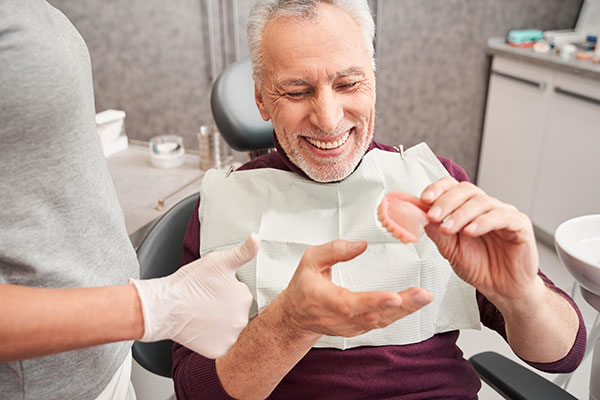Relining Dentures in Jupiter, FL
Do You Need a Denture Reline?
Relining your dentures is crucial for maintaining a comfortable fit and optimal function as time goes on. Changes in your jaw and gum tissue can cause dentures to feel loose, leading to discomfort and potential oral health issues. Relining your dentures not only restores their fit but also extends their life and improves your overall oral health.
If your dentures are loose or uncomfortable, consider a reline. Contact our Jupiter, FL, dentist, Dr. Al Villalobos, at (561) 744-0677 today to schedule your reline consultation.

What Is Denture Reline?
Denture relining involves reshaping the inner side of your dentures to fit the current shape of your gums. Dentures are custom-made when you first get them, but natural changes in the jawbone, often due to bone resorption, can cause them to loosen. Relining fills in these gaps, ensuring your dentures fit securely for maximum comfort and functionality.
Why Do Dentures Need to be Relined?
Over time, jawbone and gum tissue changes cause dentures to fit poorly. Here are some key reasons relining may be necessary:
- Normal Wear: Daily use can gradually wear down the denture base, changing the fit.
- Health Changes: Conditions like gum recession or lifestyle factors may impact fit.
- Injury or Trauma: Accidents or oral trauma can alter the jaw’s structure.
Types of Dentures Relines
Soft Denture Reline
A soft reline adds a cushion between the gums and dentures using flexible, softer material. Soft relines are ideal for sensitive gums.
- Pros of Soft Denture Reline: The soft material offers comfort, especially for sensitive gums, and adapts to changes in the mouth.
- Cons of Soft Denture Reline: Requires more frequent replacement and may not be as durable as hard relines.
Hard Denture Reline
A hard reline uses a strong resin material to reshape the denture’s base for durability and a more permanent fit.
- Pros of Hard Denture Reline: Long-lasting and offers a permanent, stable fit, resembling the original feel.
- Cons of Hard Denture Reline: May feel uncomfortable for sensitive gums and take longer to complete.
Temporary Reline
Temporary relines, also called therapeutic relines, use a medicated soft material to soothe irritated, inflamed, or infected gums and promote healing.
- Pros of Temporary Denture Reline: Provides temporary comfort and relief for inflamed or sore gums, allowing time for healing and addressing gum issues.
- Cons of Temporary Denture Reline: It’s a short-term solution as it needs to transition to soft or hard reline.
The Denture Relining Process
Step 1: Consultation and Assessment
The first step involves a consultation with our dentist in Jupiter. They’ll examine your mouth, assess the fit of your dentures, and discuss the best reline option for your specific needs.
Step 2: Preparing the Denture
Our Jupiter dentist will remove a thin layer of material from the denture base, making room for the reline material. This step is essential to ensure that the new material bonds well and achieves the best fit.
Step 3: Application of the Reline Material
Depending on the type of reline, our dentist will apply a layer of soft or hard reline material to the underside of the denture. The denture is then placed in your mouth to shape the material to the contours of your gums.
Step 4: Setting and Finishing
Once the material has been set, Dr. Villalobos will smooth and polish the relined denture. The result should be a snug, comfortable fit that matches the current shape of your gums.
Benefits of Relining Dentures
Relining provides multiple advantages that contribute to your comfort, confidence, and oral health:
- Enhanced Comfort: Relining minimizes gum pressure and creates a snug fit, preventing soreness.
- Improved Stability: A secure fit makes eating, talking, and socializing easier and more enjoyable.
- Better Oral Health: A well-fitted denture reduces irritation and the risk of sores and infections.
- Cost Savings: Relining extends the life of your dentures, allowing you to delay replacements.
How Often Should You Reline Your Dentures?
Many dentists recommend relining every one to two years, depending on individual needs. Regular adjustments help maintain a comfortable, functional fit, prolonging the denture’s lifespan.
Signs You Need Denture Relining
Relining is usually needed when you start noticing any of the following signs:
- Loose dentures: If your dentures move around or slip when speaking or eating.
- Sore spots: Pain or irritation from dentures rubbing against your gums.
- Difficulty chewing: Food becoming harder to chew can indicate a poor fit.
- Changes in speech: Changes in how you speak or difficulty pronouncing certain words.
Costs and Duration of Denture Relines
Average Costs
In the United States, the cost of soft relines typically ranges from $300 to $500, while hard relines generally cost between $200 and $450. Temporary relines are usually less expensive, costing around $100 to $200. The average costs vary depending on the type of reline you choose, with each option offering different benefits and longevity.
How Long Relines Last
The lifespan of denture relines varies based on the type used and the care taken. Here’s a breakdown of the different types:
- Soft relines: These need to be done every one to two years, depending on wear and maintenance.
- Hard relines: Can last from one to two years with proper care.
- Temporary relines: Designed for short-term use, typically lasting only a few weeks.
Post-Reline Care for Dentures
After getting your dentures relined, here’s what you need to do:
- Cleaning: Use a gentle brush and non-abrasive cleaner to maintain your relined dentures.
- Avoid Adhesives: Avoid using denture adhesives right after a reline, as it can disrupt the reline; let the material set and bond naturally.
- Regular Check-ups: Visit our office regularly to maintain the fit and quality of your dentures.
Can You Reline Dentures at Home?
While some may consider relining their dentures at home, professional assistance is generally recommended due to the potential risks and complications. Professional denture relines ensure optimal fit and comfort, utilizing specialized materials and techniques that are difficult to replicate at home. DIY relines can result in improper fit, discomfort, and even damage to the dentures.

Frequently Asked Questions
Restore Comfort & Stability with Denture Relining at Al Villalobos, DMD, PA
Relining your dentures is an essential part of maintaining their comfort and fitness, improving both your oral health and quality of life. If your dentures no longer feel secure, contact our Jupiter dental team for a reline consultation.
Whether you need a soft, hard, or temporary reline, we’re here to help. Call us at (561) 744-0677 to schedule your appointment. We proudly serve patients in Jupiter, Hobe Sound, Limestone Creek, and Tequesta, FL.

